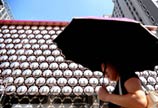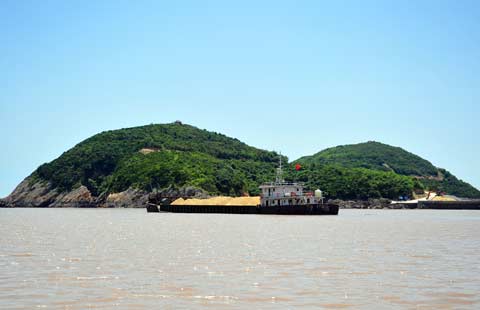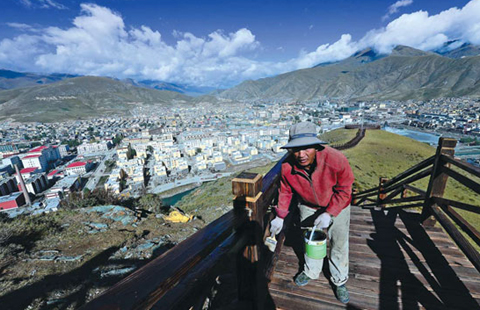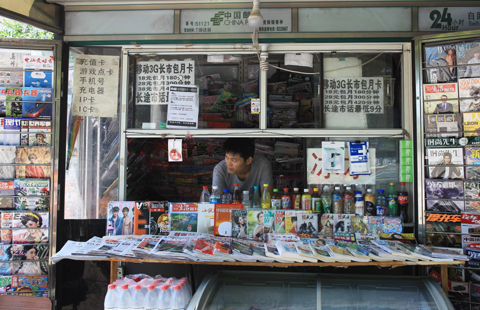New lives and hope in post-quake Yushu
(Xinhua) Updated: 2012-04-21 21:48XINING - It has been two years since the earthquake in Yushu, a Tibetan autonomous prefecture in northwest China's Qinghai province, took away Sonam Tsomo's son and daughter, but she can still hear them asking for mom in her dreams.
She always remembers April 14, 2010, the day when she dug, with bare hands, the dust-covered and cold bodies of her eight-year-old twins out of the ruins caused by the 7.1-magnitude quake. "Suddenly, I was in hell," the 40 year old recalls.
Her pain has lingered, but eased a little only recently. Four months ago, Sonam Tsomo gave birth to a baby boy, bringing laughter back to the once-devastated family.
As Qinghai and the rest of China are marking the second anniversary of the terrible natural disaster and its fallout, Sonam Tsomo and husband Nyima Dhondup are glad to be among 175 people in post-quake Yushu who local authorities have declared eligible to have a second child.
"It feels as if one of the lost has returned," says father Nyima Dhondup, who injured his back in the quake and has not yet recovered. But he hardly feels pain when holding the newborn baby.
It was a year after the quake that the couple decided to have another child, and the province's family planning policies gave them the green light where there would usually only have been stop signs.
In 2010, the natural disaster left 2,698 people dead in Yushu, killing and disabling the children of many families.
According to the province's post-quake family planning policies, families whose children were killed or disabled, providing some criteria were met, have been passed to bear another child. Free medical services spanning pregnancy and delivery are provided for such families.
Sonam Tsomo got her intrauterine device removed and was treated for gynecological diseases at the local hospital. She prostrated toward the Buddha statue in her tent every day, praying for one more chance to be a mother.
In March of 2011, she found herself pregnant. Three months later, the couple moved into a new house that the government helped build. "Hope has come back to us along with the baby," Sonam Tsomo says.
Given her age, the days of pregnancy were much harder than when she was young, but every fetal movement was delightful enough for her to forget discomfort until she gave birth to a baby boy at the local hospital.
When the baby was 10 days old, as local custom requires, the couple went to nearby Domkar Monastery and asked the Tulku to bestow a name. Domochojye Chogyal Tulku named the baby Tenpa Yabgye, meaning "everything will prosper" in the Tibetan language.
"I wish him lifelong safety and health," Sonam Tsomo said.
She will always miss the deceased twins. Now and then she takes the clothes they used to wear out of the wardrobe and caresses them while sobbing. But she has become less desperate than before.
Looking at Tenpa Yabgye in her arms, Sonam Tsomo said she had determined to work harder and "live a better life."
Of the 175 couples in post-quake Yushu who are eligible to have one more child, 37 have so far embraced a new life, and three more are about to do so.
Tsering Drolkar is expecting to give birth in a couple of days, and she has got new clothes and quilts ready. "I have a hunch it is going to be a boy," the 26-year-old mother says.
She lost an eight-year-old daughter to the quake. "I had difficulty sleeping during the following year and often wailed with my husband," she remembers.
Last September, though, Tsering Drolkar's younger sister gave birth to a girl who, according to a diviner in the village, is the reincarnation of her deceased daughter. Now she goes to visit the child every day.
Tsering Drolkar believes the baby now in her womb must also be the reincarnation of some child that a mother misses day and night. "No matter whose child it used to be, I will love it deeply and raise it safe and sound," she promises.
- Xi praises Deng Xiaoping's legacy
- Property registration bureau set up
- Xinjiang officials punished for dereliction of duty
- Sydney Opera House replica dismantled in NE China
- 7 stand trial over deadly arson attack in E China
- Movie star Jackie Chan apologizes for son
- Demolished churches were built illegally, officials say
- President urges Uzbek investment boost
- State Council calls on Northeast China to act rapidly on slums, jobs
- Shanghai finds balance on public info







